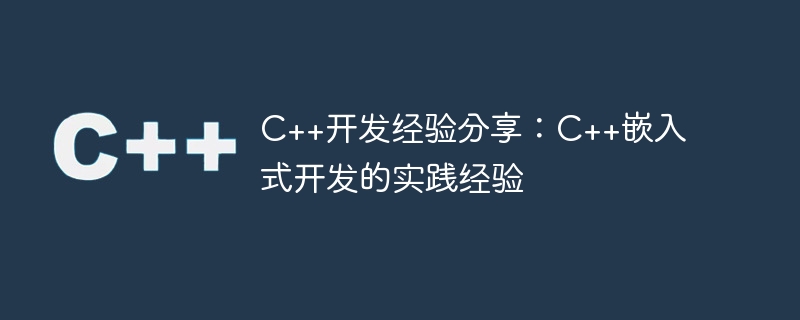Home >Backend Development >C++ >C++ development experience sharing: practical experience in C++ embedded development
C++ development experience sharing: practical experience in C++ embedded development
- 王林Original
- 2023-11-22 09:29:041514browse

In embedded development, C is a very important programming language. Compared with other embedded languages, C has stronger programming capabilities and higher flexibility. Developers can use C to develop more efficient and reliable embedded systems. This article will share some practical experiences in C embedded development.
- Understand the characteristics of embedded systems
In embedded systems, usually limited hardware resources need to be managed effectively. Understanding the limitations of these hardware resources can help developers better understand the characteristics of embedded systems. For example, embedded systems usually need to consider issues such as memory capacity and speed, processor speed and power consumption, and communication between external devices and the system.
- Familiar with C language features
In the field of embedded development, developers need to be proficient in C language features, such as operator overloading, templates, polymorphism and exception handling, etc. . These features make C more powerful and flexible in embedded systems.
- Choose appropriate development tools
Choosing appropriate development tools can improve development efficiency and code quality. There are many embedded development tools to choose from, such as Keil, IAR, and Eclipse, among others. These tools can provide debugging, building, coverage analysis, code inspection and other functions to help developers better develop and test programs.
- Applying C to embedded operating systems
Embedded systems usually have operating systems. Using C to program the operating system can improve the modularity and reproducibility of the code. Reusability. For example, C can achieve more concise and efficient programming by defining classes and using inheritance of classes.
- Streamlined Programming
In the field of embedded development, code size and speed are very important. Compared with other languages, C code is more likely to become bloated, so program design needs to be as streamlined as possible. Program code can be effectively optimized using techniques such as inline functions, templates, and memory pools.
- Carry out code optimization
Code optimization is an important aspect of embedded development. Common code optimization techniques include reducing the number of function calls, reducing memory allocation, using compiler optimization, etc. Code optimization can significantly improve the running speed and efficiency of your program.
- Testing and debugging
In the process of writing embedded programs, testing and debugging are crucial. Since embedded system hardware resources are limited, testing and debugging cannot be performed on actual hardware devices. To solve this problem, emulators and virtual environments can be used for testing and debugging.
Summary
This article introduces some practical experience in C embedded development, including understanding the characteristics of embedded systems, becoming familiar with C language features, choosing appropriate development tools, and applying C to embedded systems. Operating systems, streamlined programming, code optimization, testing and debugging, etc. These experiences can help developers better develop efficient and reliable embedded systems.
The above is the detailed content of C++ development experience sharing: practical experience in C++ embedded development. For more information, please follow other related articles on the PHP Chinese website!
Related articles
See more- C++ compilation error: A header file is referenced multiple times, how to solve it?
- C++ compilation error: wrong function parameters, how to fix it?
- C++ error: The constructor must be declared in the public area, how to deal with it?
- Process management and thread synchronization in C++
- How to deal with data splitting problems in C++ development

